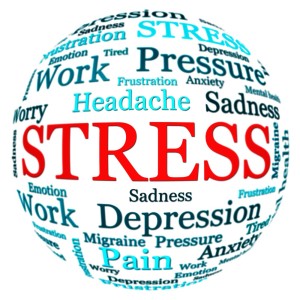[vc_row][vc_column][vc_column_text]

Everyone is busy these days. You could be a busy executive or a busy stay-at-home mum. We all try to do everything well and fit a lot into our day. We tick things off our to do lists only to add in twice as many things we “need’ to get done, especially around this time of year. We rush around trying to get all our lists done so we can relax for our Christmas break. Exhausting!
Can this stress, caused by the pressures of a busy life be contributing to your weight?
The answer is a resounding yes!
1. A common coping mechanism when we are stressed is to eat, and to eat certain foods or drink alcohol to ‘unwind.’ If you’re a stress-eater, you’re unlikely to be reaching for a salad to feel better. You’re much more likely to think I need some chips or chocolate or a glass of wine to cheer me up. When you eat these foods there is a rise in the brain chemicals that make us feel more relaxed and happy. If stress is a regular occurrence and you become chronically stressed and overeat or drink weight gain is inevitable. 2. There is also a physiological effect of stress. A number of hormones are involved but the principal one when it comes to weight, is cortisol. When you’re stressed, cortisol rises and this can have a negative effect on your weight as it increases your appetite, making it more likely you’ll overeat. There is also a link between high cortisol levels and storage of body fat, particularly “visceral” abdominal body fat.
So what can we do to try to lower cortisol levels?
We can’t live entirely stress-free lives and neither would it be entirely beneficial to, as we need a certain amount of stress for motivation to get things done. If you have a deadline coming up a bit of stress is needed to focus your mind and get you completing tasks. We want to lower our stress levels if they are getting so high that it’s affecting our health and to recognise when the balance is tipping in the wrong direction. If you’re irritable with your partner or your kids, feeling overwhelmed constantly, finding it hard to slow your mind and enjoy the moment or turning to food or alcohol as a coping mechanism then it’s probably time to think about how you are currently managing your stress.
7 Tips to Manage Stress
Sleep
Aside from having an independent impact on weight control, sleep is also important for stress management. However, stress may be stopping you from sleeping well. Aim to get eight to 9 hours on most nights and get to bed by 10 pm. You will notice the difference. When you have a good sleep everything is easier, you stay calm and tasks or stressors are easier to handle.
Laughter
Laughing is good for us physiological and psychologically. Get together with friends or family who make you laugh, play silly games with your kids, watch a comedy or dance around your living room singing into your hairbrush ☺ Your brain chemistry shifts, your blood pressure comes down and stress disappears. Laughter is great for the soul and stressors are eased or forgotten.
Fish oils
There have been a number of studies showing that taking fish oils improves body composition (i.e., increases muscle mass while decreasing fat) and the effect seems to be due at least in part to a decrease in cortisol. I find fish oils help to regulate my mood and help create calm. I recommend taking a daily supplement and consuming oily fish at least twice a week.
Time Out
When we’re stressed it can be hard to see that the most effective thing to do is to take a break. Going for a walk where you get fresh air, some sunshine and space to think through and organise your thoughts can be just what you need. When we take breaks and come back to work, that problem or writers block seems to disappear.
Friendships/Relationships
Catching up even briefly for an hour with a friend for coffee and a chat or combine the catch up with exercise and a walk is great for reducing stress.
Yoga
Yoga and stretching have many benefits and can be practiced by just about everyone. Choose between more meditative forms that focus on breathing and flexibility, or stronger styles like Power Yoga that are more full on workouts.
Meditation
This doesn’t need to be full on, you can practice mindful meditation that you can use in any five-minute slot of the day when you need to just take a moment to breath and calm down. There are a number of excellent studies in support of meditation to bring down blood pressure, manage stress and promote calm.[/vc_column_text][/vc_column][/vc_row]

